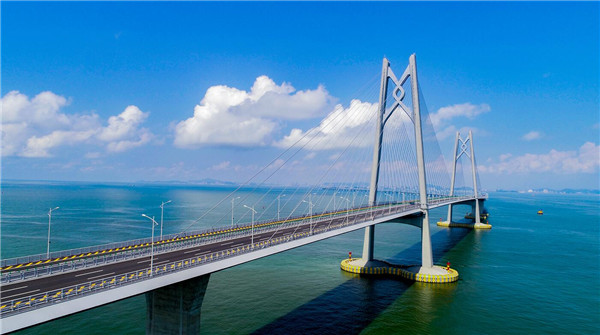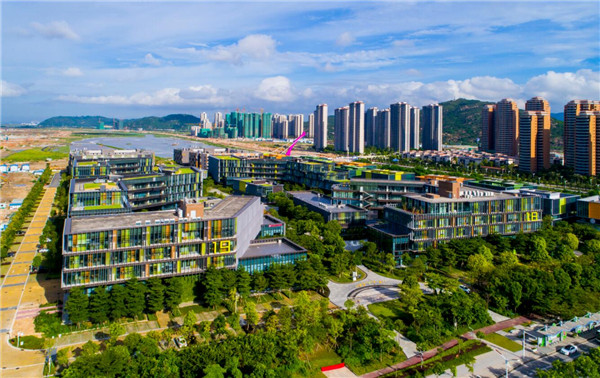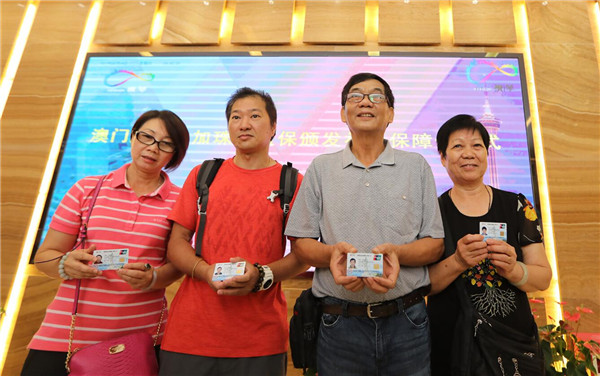Zhuhai Special Economic Zone marks 39th anniversary

What started as 7 sq km (2.7 sq miles) in a quaint border town that had recently been designated a city is now 39 years old and a powerhouse on the west bank of the Pearl River Estuary -- the Zhuhai Special Economic Zone.
On Aug 26, 1980, the National People's Congress formally approved the establishment of the country's first special economic zones in Shenzhen, Zhuhai, and Shantou in Guangdong province to encourage overseas investment and boost economic growth.
Since then, the SEZ as expanded throughout Zhuhai's 1,724 sq meters (666 sq miles) into a pioneer of reform and innovation, cooperation with Macao, ecological civilization, and quality livelihood.
Over the nearly four decades, GDP has risen from 209 million yuan ($29 million) in 1979 -- the year it officially went from county to become a city -- to 291.5 billion yuan ($40.8 billion) in 2018. The city now has more than 3,000 foreign trade enterprises, which have transactions with 223 countries and regions. Zhuhai's comprehensive strength in foreign trade has ranked among China's top 10 for years.

Hong Kong-Zhuhai-Macao Bridge [Photo by Wu Changfu / Zhuhai Daily]
Deeper Zhuhai-Macao cooperation
Hengqin New Area, a bridgehead of Zhuhai's keen development and epicenter of cooperation with Macao, was approved by the State Council in 2009. It became the third national "new area" in China after Tianjin's Binhai and Shanghai's Pudong new areas. In 2015, it was given a new mission as part of the China (Guangdong) Pilot Free Trade Zone (FTZ).
Over the past four years, the Hengqin FTZ has seen GDP increase from 6.8 billion yuan ($951.6 million) in 2014 to 24.4 billion yuan ($3.4 billion) in 2018 with annualized growth of 29.1 percent. Fixed-asset investment rose from 24.7 billion yuan ($3.5 billion) to 57.2 billion yuan ($8 billion) with year-on-year growth of 18.3 percent, while actually used foreign capital soared from $257 million to $1.06 billion with an annualized growth rate of 32.7 percent.

Macau-Hengqin Youth Entrepreneurship Valley (Inno Valley HQ) [Photo by Li Jianshu / Zhuhai Daily]
Meanwhile, the FTZ achieved 370 institutional innovations. Two were selected as Best Practices of National Pilot FTZs, seven measures were promoted nationwide, and 52 procedures were cited throughout Guangdong.
By 2018, Hengqin had more than 60,000 business entities. The welcoming environment saw 774 Hong Kong and Macao enterprises register in the area last year, bringing the total to more than 2,700.
Guangdong-Macao Cooperation Industrial Park, Traditional Chinese Medicine (TCM) Science & Technology Industrial Park of Cooperation Between Guangdong & Macao, and Macau-Hengqin Youth Entrepreneurship Valley (Inno Valley HQ) have advanced Zhuhai-Macao synergetic development in hi-tech, characterized finance, healthcare, and other emerging industries.

Traditional Chinese Medicine (TCM) Science & Technology Industrial Park of Cooperation Between Guangdong & Macao [Photo by Li Jianshu / Zhuhai Daily]
Today, Hengqin is becoming an International Recreation Island to supplement Macao's mission of being a world tourism and leisure center. Furthermore, a cooperation demonstration zone is envisioned to develop cross-border finance.
Commercial ties with the two nearby special administrative regions strengthened with the opening of the Hong Kong-Zhuhai-Macao Bridge in 2018 and initiation of the Guangdong-Hong Kong-Macao Greater Bay Area. It will be further boosted with greater connectivity when the Guangzhou-Jiangmen-Zhuhai-Macao and Guangzhou-Zhongshan-Zhuhai-Macao high-speed railways are completed.
Livelihood projects such as Macao New Neighborhood, which will provide facilities and public services for the way of life the former Portuguese colonists are used to. The proposed Qingmao Checkpoint (New Guangdong-Macao Channel) in Gongbei will also help cement the bond.
Moreover, since July 1, Macao residents who live in Hengqin New Area have been eligible for coverage by the city's basic medical insurance.

First four Macao residents obtain Health Insurance Cards [Photo by Li Jianshu / Zhuhai Daily]
Innovation highland
Over the past 39 years, numerous Zhuhai enterprises have gained world attention for key technologies and products. Gree Electric Appliances made it onto the Fortune Global 500 list for the first time in July. The Zhuhai base of China Aviation Industry General Aircraft (CAIGA) developed the AG600, the world's largest amphibious aircraft. Zhuhai Orbita Aerospace Science & Technology created the "Zhuhai-1" micro-nano constellation, a commercial data system for hyperspectral and video satellites.
As of June 30, Zhuhai had become home to 2,055 hi-tech enterprises. Forty-four, including Meizu Technology, Yunzhou-Tech (Oceanalpha) and Naruida, will reach unicorn status; that is they will have a market value of at least $1 billion before going public.
Beyond that, the city has attracted technology giants Huawei, Alibaba, and Tencent for in-depth cooperation in developing smart cities, artificial intelligence, cloud computing, and microchips.
Well-preserved ecology
In hand with leapfrog economic development, Zhuhai has nonetheless retained a favorable ecological environment by adhering to the concept of "Green Hills and Clear Waters Are Gold & Silver Mountains."

Yeli Island Park, Hi City complex, and Zhuhai Opera House in Old Xiangzhou amid 'Gold & Silver Mountains' [Photo by Wu Changfu / Zhuhai Daily]
It was named one of the first National Garden Cities in 1992 and won the Dubai International Award for Best Practice in Improving the Living Environment granted by the UN Center for Human Settlements in 1998, the first as a city across China. It was also listed among Demonstration Cities & Counties of China Ecological Civilization Construction by the Ministry of Environmental Protection in 2017.
Benefiting the people
Furthermore, leaps and bounds have been made in improving the wellbeing of residents. For instance, in 1993, Zhuhai issued the first national social insurance regulation. In 2002, the lead was taken in establishing serious illness medical insurance for migrant workers. In 2007, 12 years of free education was implemented for local primary and secondary school students. Then, in 2018, ticket prices on all city bus routes were lowered to 1 yuan (14 cents).
Last year, nearly 70 percent of Zhuhai's fiscal expenditure was invested in nine categories benefiting livelihoods, an increase of 12.9 percent year-on-year. Improving the quality of daily life justified double-digit growth in disbursements for that purpose over 11 consecutive years.







